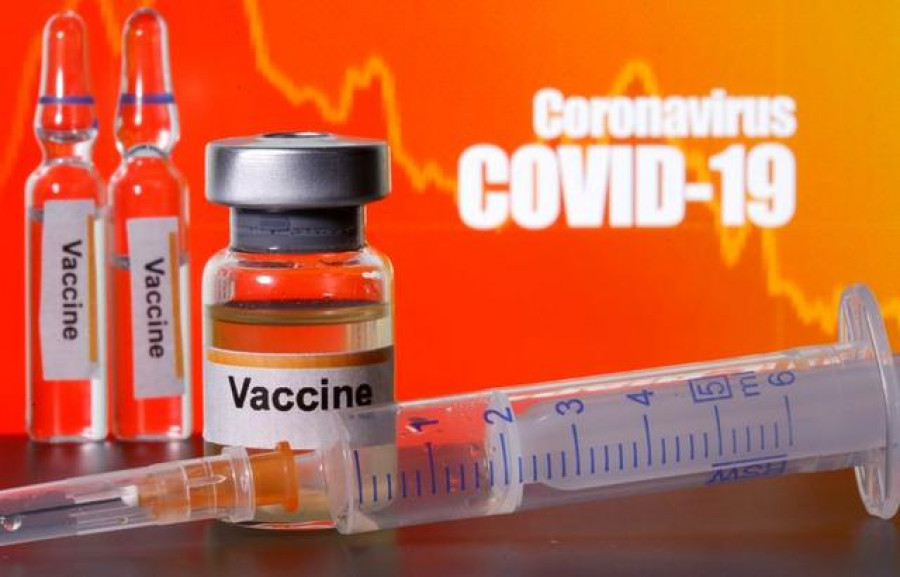Health
Health workers get training for Covid-19 immunisation campaign
Vaccination drive starts tomorrow in over 50 districts. Politicians and bureaucrats to get the jabs in the second phase.
Arjun Poudel
Health workers serving across the country on Monday got training on administering the Covid-19 vaccine received from India in grant.
The Child Health Section at the Family Welfare Division of the Department of Health Services said that around 200 health workers of the three districts of Kathmandu Valley assembled for training on the immunisation. Frontline health workers will receive the Covid-19 vaccine in the first phase.
Health workers serving in the provinces and the districts received the training online, Dr Jhalak Sharma, chief of the section, told the Post.
India delivered one million doses of the vaccine developed by the University of Oxford and pharmaceutical giants AstraZeneca and produced in India by the Serum Institute of India on Thursday.
Health workers have been asked to note the details of frontline workers before administering the vaccine, tell them clearly about the possible side effects and refer them to health facilities if the vaccine recipient develops some serious complications.
They are asked to send the immunised people home only after half an hour of injecting the dose.
“This is a safe vaccine, to which many countries have given emergency use approval,” said Sharma. Frontline workers have been prioritised for the vaccine to better prepare them for saving the lives of others.
The Ministry of Health and Population said that the vaccine has already reached the provinces and some district hospitals.
“Vaccines will reach most of the district hospitals by tomorrow,” Dr Roshan Pokhrel, chief specialist at the Health Ministry, told the Post. “Immunisation will start simultaneously in over 50 districts on Wednesday.”
The drive will be delayed in some remote districts, as transportation of the vaccines will take time.
The Health Ministry plans to immunise around 430,000 frontline workers, including health workers, supporting staff, female community health volunteers, sanitation workers and ambulance drivers. Elderly people taking refuge in old age homes and jailbirds will be immunised after the frontline workers. Half of the vaccine will be saved for a second dose, as each person needs two doses.
“Vaccines provided by India under grant assistance are only for the frontline workers,” added Pokhrel. “No politicians or bureaucrats will be vaccinated in the first phase; they will be immunised in the second phase. Prime Minister KP Sharma Oli will only inaugurate the programme.”
Officials at the Health Ministry said around 50 immunisation booths will be operated in around one and half dozen hospitals of Kathmandu Valley.
Experts say the government must also launch programmes so as to make the people aware of the vaccines they are being administered and the possible side effects.
“We should not forget that rumors and misinformation spread more quickly than facts,” Dr Bikash Lamichhane, former director at the Child Health Division, told the Post.
The Serum Institute of India in its fact sheet has listed the possible side effects of the vaccine based on the reports it has received after the rollout.
According to the company, some very common, which may be seen in more than 1 in 10 people, side effects include tenderness, pain, warmth, redness, itching, swelling or bruising where the injection is given.
People may feel generally unwell, tired or can have chills or a feverish feeling. Nausea and joint pain or muscle ache are other possible side effects.
Other common side effects, which may be seen in up to 1 in 10 people, include a lump at the injection site, fever, being sick (vomiting) and flu-like symptoms (high temperature, sore throat, runny nose, cough and chills).
Some uncommon side effects, which may be seen in up to 1 in 100 people, include feeling dizzy, loss of appetite, abdominal pain, enlarged lymph nodes, excessive sweating and itchy skin or rashes.
Officials at the Health Ministry, however, hope people would not hesitate to receive the jab, as it is a quality product.
“I’d like to request all frontline health workers to get immunised without any fear,” Dr Jageshwor Gautam, spokesperson for the Health Ministry, told the Post. “Within a week to 10 days we will complete administering the first dose of vaccine to the selected people.”




 14.24°C Kathmandu
14.24°C Kathmandu















